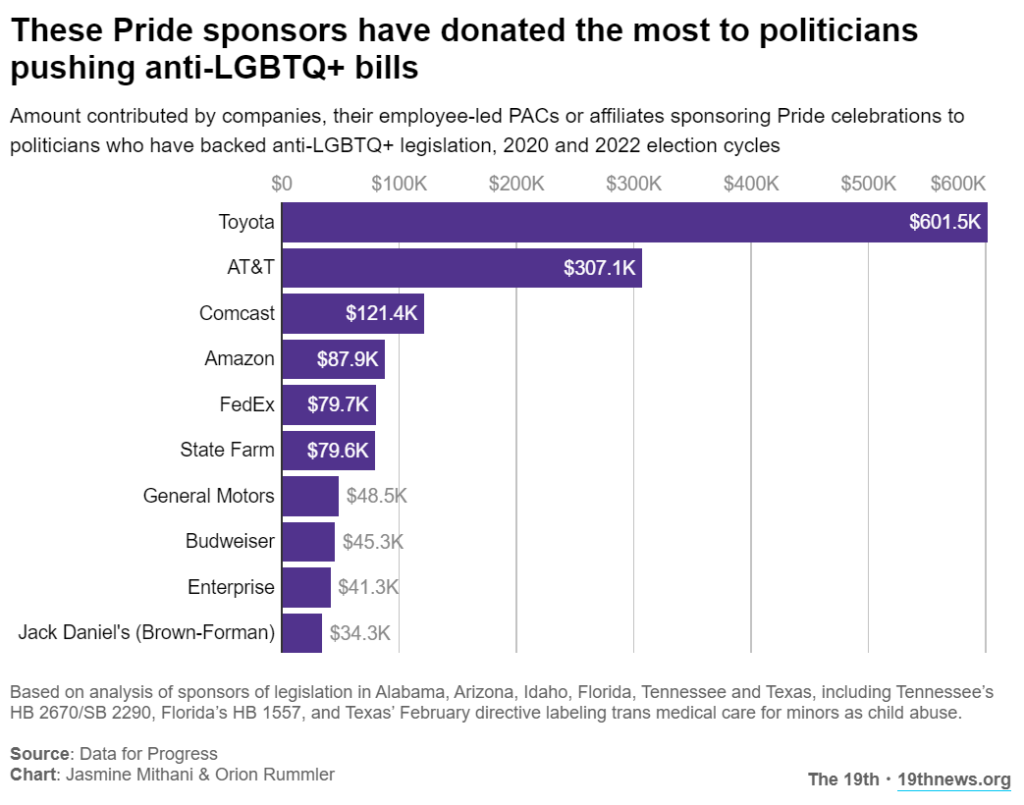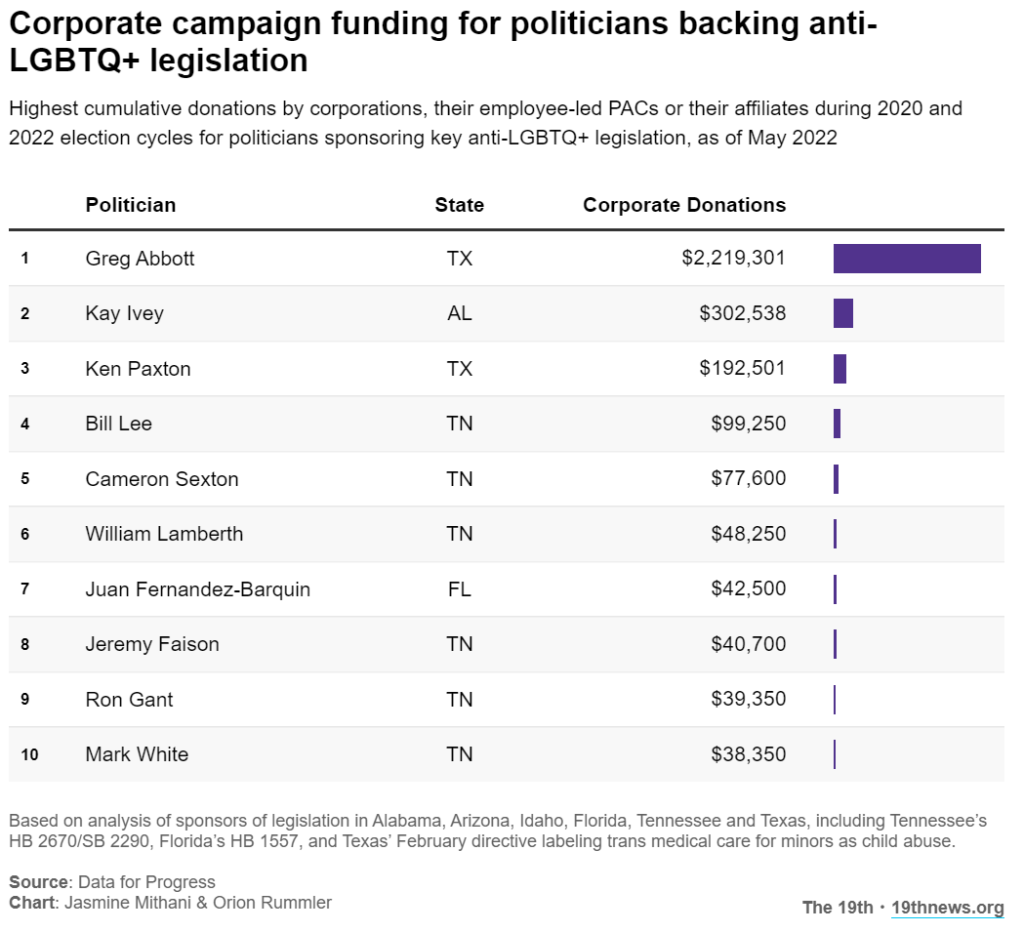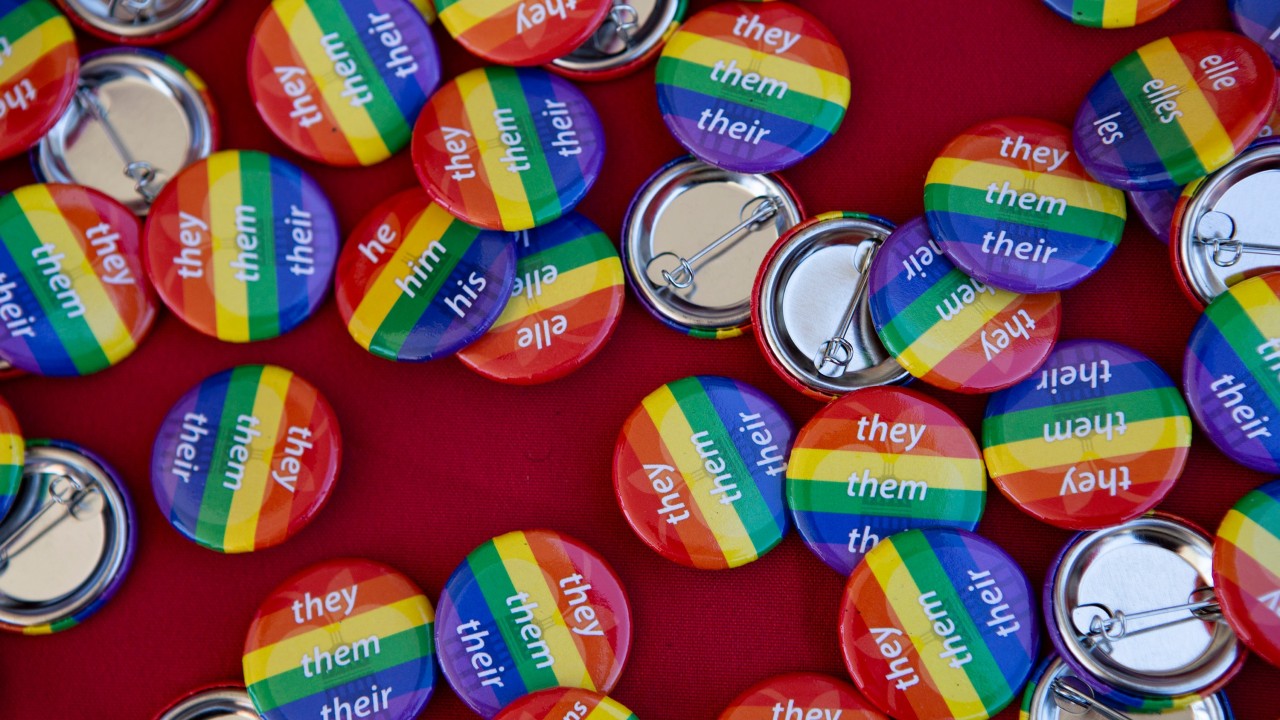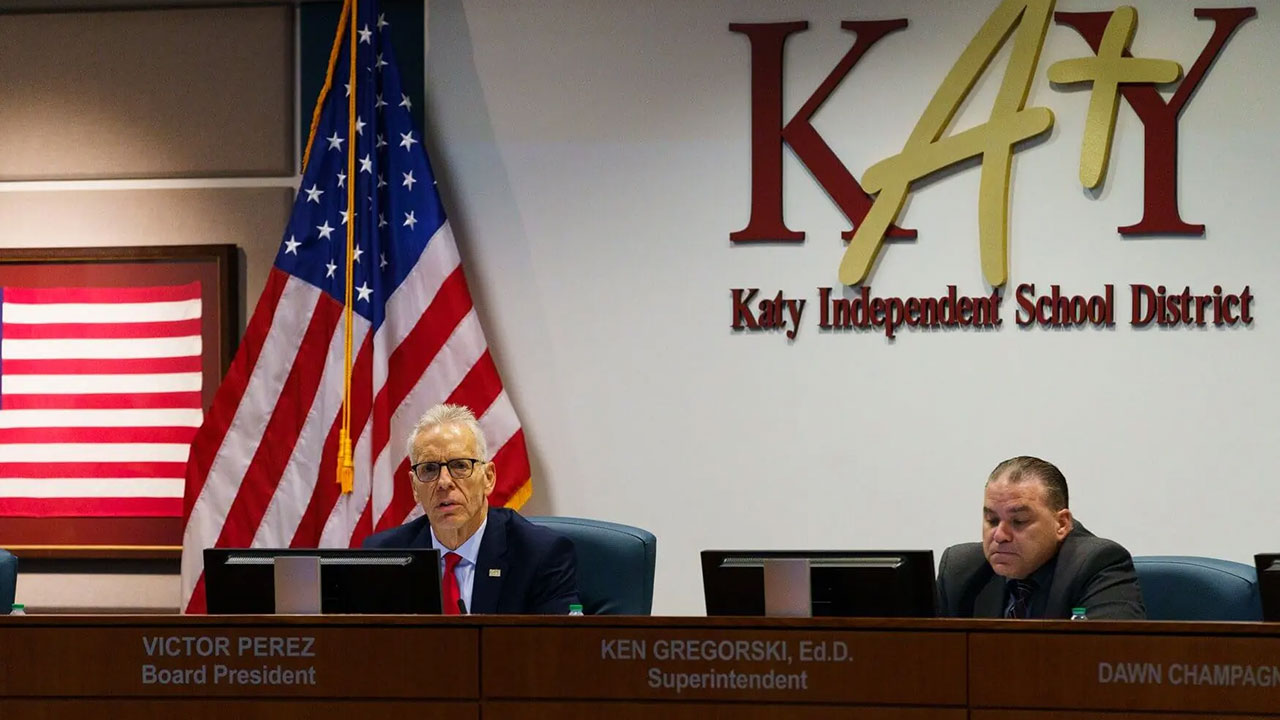US
These companies publicly oppose anti-LGBTQ+ bills. Some fund lawmakers who sponsor them.
Lawmakers in 6 states with a high number of anti-LGBTQ+ bills received hundreds of thousands from major companies in the 2020 and 2022 election cycles.

This story was originally published by The 19th
 After signing a pledge opposing anti-LGBTQ+ state legislation last spring, companies like AT&T, Amazon, Pfizer, and CVS Health gave thousands of dollars to the campaign efforts of lawmakers who had been backing such bills, according to a recent analysis from Data for Progress, a left-leaning polling firm.
After signing a pledge opposing anti-LGBTQ+ state legislation last spring, companies like AT&T, Amazon, Pfizer, and CVS Health gave thousands of dollars to the campaign efforts of lawmakers who had been backing such bills, according to a recent analysis from Data for Progress, a left-leaning polling firm.
Lawmakers in six states who wrote, signed or sponsored anti-LGBTQ+ legislation received tens of thousands and, in a few cases, hundreds of thousands of dollars, from major U.S. corporations in the 2020 and 2022 election cycles, Data for Progress found.
Alabama, Florida, Arizona, Tennessee, Idaho and Texas have been prolific in their efforts to bar trans students from school sports, restrict gender-affirming care for minors and ban LGBTQ+ discussions from classrooms over the past few years.
At least seven companies tracked by Data for Progress continued campaign donations for the 2022 election cycle to politicians backing anti-LGBTQ+ legislation after signing a pledge against such bills from the Human Rights Campaign and Freedom for All Americans. The pledge says the companies “are deeply concerned” about anti-LGBTQ+ bills and that they call for “public leaders to abandon or oppose” the legislation, but it did not explicitly address campaign donations.
Thirty companies that made campaign contributions were also official Pride sponsors in 2021 or 2022 for various cities across the country. Other companies, including General Motors, signed the pledge after making donations for the 2020 campaign cycle but have not given since then, according to the analysis, which goes through May.
Companies have long engaged in political spending that contradicts their public values while seeking to back other interests, such as favorable and unrelated legislation. This discrepancy is can be particularly stark during Pride month. While the donations may not have been made with anti-LGBTQ+ bills in mind, the money carries extra weight in the states that Data for Progress studied, since lawmakers there have actually passed anti-LGBTQ+ and anti-trans legislation after introducing bills at a rapid pace, local and national LGBTQ+ advocates said.

Among the six states studied by Data for Progress, Alabama had the highest number of anti-LGBTQ+ lawmakers receiving corporate campaign contributions. The state recently passed a felony ban on puberty-blocking medication or hormone treatment for transgender youth — one of the strictest bills limiting access to medical care. It was blocked last month by a federal judge.
Dillon Nettles, policy and advocacy director for the ACLU of Alabama, said the funding from companies that have publicly espoused support for LGBTQ+ rights is “deeply disappointing” — and shows an inconsistent commitment to supporting the community.
“It seems really risky for companies at this point in time to be willing to backslide on that commitment knowing that this is a moment where the country is being more activated and galvanized by these attacks on trans rights, and even more broadly, LGBTQ+ rights,” he said.
Data for Progress’ analysis is also just a small snapshot of the larger campaign finance contributions that major companies have made to anti-LGBTQ+ lawmakers across the country. The newsletter Popular Information has tracked such spending for several years and has found that 25 companies eager to publicly celebrate Pride have donated $13 million since the start of last year to politicians backing anti-LGBTQ+ bills.
The 19th reached out to 16 companies for comment regarding their campaign contributions to politicians who had backed anti-LGBTQ+ legislation. None responded except AT&T, which made the second-most donations of any company tracked by Data for Progress. (Toyota gave the most.)
When taking public positions on government policies, AT&T focuses on areas such as broadband access and expansion, spokesperson Alex Byers said in an emailed statement.
“Contributions to a particular lawmaker do not mean we support their views or actions on every issue,” he said. “We are mindful of diverse and complex societal issues that affect us, and we most immediately address these issues through direct social programs, philanthropy, employee benefits, and community involvement.”

None of the lawmakers named in this story returned requests for comment.
Victoria Kirby York, deputy executive director of the LGBTQ+ advocacy organization National Black Justice Coalition, said that as anti-trans rhetoric among Republican lawmakers grows and more bills are actually making it into law, corporations that want to support LGBTQ+ people need to reevaluate their relationships with state politicians.
“There’s definitely a cognitive dissonance in saying you’re about equality and discrimination protections and for racial justice and LGBTQ+ equity and all of the things, and then to give millions upon millions of dollars to people working to undermine and demolish those protections,” they said.
In Data for Progress’ analysis, contributions to Texas Gov. Greg Abbott’s campaigns account for well over half of the total money spent on anti-LGBTQ politicians across these six states. He received just over $2.2 million, primarily from three companies based in Texas: Toyota, AT&T and Enterprise Products Partners, an oil and gas company, per Data for Progress’ count.
Alabama Gov. Kay Ivey, the second-highest-funded politician the organization tracked, received $302,000 for her reelection efforts, the bulk of it coming from Southern Co., which oversees Alabama Power. Several of her recent campaign ads have specifically showcased her support for anti-trans bills. Texas Attorney General Ken Paxton ranked third in campaign contributions at $192,000, with USAA and Farmers Insurance making the biggest donations.
In Texas, the state legislature held back-to-back special legislative sessions in 2021, with the last two specifically called to discuss anti-trans measures, among other bills. This year, Paxton issued an opinion labeling gender-affirming care as child abuse, and under Abbott’s order the state began investigations into families accessing gender-affirming care for their children. (The ACLU and Lambda Legal have filed another lawsuit to block state probes.)
Following months of those legislative sessions, Toyota, a Pride sponsor for Los Angeles this year, contributed $150,000 to Abbott’s reelection efforts in December, Data for Progress found. AT&T, which signed the Human Rights Campaign and Freedom for All Americans pledge against anti-LGBTQ+ legislation last spring,gave $10,000 to Paxton’s campaign in February this year.
To Adri Pérez, a policy and advocacy strategist at the ACLU of Texas, the campaign funds are a clear signal that many corporations will put their own self-interests ahead of standing with LGBTQ+ people.
While Pérez said companies need to be held accountable, they aren’t sure this is possible unless everyone makes a conscious choice to put that pressure on — including the LGBTQ+ groups platforming businesses that say they support LGBTQ+ rights.
“Do they have to be held accountable? Yeah. Are they going to change their minds? I don’t know,” they said.
Emmett Schelling, executive director of the Transgender Education Network of Texas, said that making a pledge to oppose anti-LGBTQ+ legislation while funding politicians who back these laws is ultimately meaningless. Advocates need meaningful help to get out of a “continued cycle of horrific moments,” he said, and to him that means going beyond publicly denouncing legislation after the fact.
Companies need to commit to employ more trans people, to provide benefits for queer families, and to not funding elected officials targeting trans youth, he said — while consumers need to reject a lack of integrity from companies who publicly back LGBTQ+ rights.
“It’s not going to change overnight,” he said. “And at the end of the day, the people have the power to intervene in this.”
Rachael Salisbury, vice president at a political research firm for progressive campaigns, who co-authored the Data for Progress analysis as a fellow for the organization, said she hopes that Pride organizations will use the data to screen companies that want to sponsor their events — and that companies will stop such donations.
When companies sign pledges against anti-LGBTQ+ bills, including the pledge by HRC and Freedom for All Americans, “those are just pretty words at this point,” she said.
“I want to give those leaders of those companies the benefit of the doubt, and hopefully they’re not being intentionally duplicitous, but even if it is just carelessness, we can’t tolerate that in our allies anymore,” Salisbury said.
HRC and Freedom for All Americans said in emailed statements that working with companies on issues like political contributions or private lobbying, respectively, are key parts of their advocacy work for LGBTQ+ rights.
“We encourage companies not to donate to anti-LGBTQ+ politicians, and to reckon with how damaging and harmful those donations are to the community, including their own LGBTQ+ employees,” HRC press secretary Aryn Fields said in a statement.
“Companies have a singular ability to gain audience with lawmakers across the political spectrum, and can help share both the human and business reasons that this kind of policymaking is at odds with corporate values, public opinion, and long-term competitiveness,” Freedom for All Americans communications VP Angela Dallara said in an emailed statement.
On whether LGBTQ+ groups should ask companies for financial commitments when signing pledges against anti-LGBTQ+ bills, or if something should be done differently on such letters, Freedom for All Americans does not have a position, Dallara said. HRC declined to comment on what changes should be made to such pledges.
Disclosure: Pfizer, CVS Health, the Human Rights Campaign, and the chairman of Enterprise Product Partners, Randa Duncan Williams, have been financial supporters of The 19th.
The 19th is an independent, nonprofit newsroom reporting at the intersection of gender, politics and policy.
Education
Feds investigate another Texas school district for its gender identity mandate
Katy ISD’s board voted this past fall to require staff to notify parents if their child wants to use a different pronoun or identifies as a different gender.

This article originally appeared in The Texas Tribune
 The U.S. Department of Education’s Office for Civil Rights opened an investigation Monday into Katy Independent School District’s gender identity policy on the basis of gender harassment under Title IX. The investigation came nine months after the Houston Landing reported that the district adopted a policy that notifies parents if their child requests to use a different name or pronouns at school.
The U.S. Department of Education’s Office for Civil Rights opened an investigation Monday into Katy Independent School District’s gender identity policy on the basis of gender harassment under Title IX. The investigation came nine months after the Houston Landing reported that the district adopted a policy that notifies parents if their child requests to use a different name or pronouns at school.
Katy ISD did not respond to a request of how many parents have been notified this year under the new policy, which requires staff to inform parents that students are transgender or ask to use different names or pronouns.
The Houston Chronicle reported in December that the district had notified parents at least 23 times since the policy was adopted.
The gender identity policy also bars schools from teaching “gender fluidity” and denies students from competing in sports with the gender they identify with, which mirrors state legislation already regulating K-12 athletics.
Students Engaged in Advancing Texas, a student-led advocacy group, filed a complaint with the U.S. Department of Education in November regarding the policy. Katy ISD graduate and member of SEAT Cameron Samuels labels the investigation as a win against the conservative policies being passed in the district.
“Elected solely on platforms to target marginalized students, far-right school board candidates accomplished exactly what they were elected to do: weaponize identity and neglect students’ educational needs,” they said.
Title IX prohibits sex-based discrimination in educational settings or federally funded activities. Gov. Greg Abbott has loudly voiced his opposition to the federal law recently ordering the Texas Education Agency to disregard the Biden administration’s expansion of Title IX.
“The district is committed to offering equal educational opportunities to our entire community,” a spokesperson from Katy ISD told the Tribune in a response to the investigation. “While we have received the OCR filing and deny any wrongdoing, we are committed to remaining fully cooperative and responsive throughout the process.”
Victor Perez, Katy ISD board president and proponent of the policy, argued that the policy was “mischaracterized” by community members as an attack on its queer and transgender students and instead relieves the burden for staff withholding information from parents. The policy was passed at a board meeting in August with a vote of 4-3 after four hours of public comment.
Alastair Parker, a member of the Cinco Ranch High School Gender-Sexuality Alliance, spoke at the board meeting in opposition to the policy.
Parker and others argued that the policy infringes on the rights of transgender kids to express themselves and opens them to potential harm if they are outed to transphobic parents or caregivers.
Johnathan Gooch from Equality Texas, a nonprofit advocacy group for LGBTQ+ Texans, said he hopes students recognize their power to report policies like this in the wake of the increasing number of legislation targeting LGBTQ+ youth.
This isn’t the first instance in Texas of a gender related policy being investigated on the federal level. Carroll ISD in Tarrant County was reported to have eight open investigations last February after it eliminated protections over race, religion, gender and sexual orientation.
There are documented mental health benefits to using preferred pronouns. A research team at the University Texas at Austin conducted a study in which they concluded that students in gender-affirming environments report 71% fewer symptoms of severe depression, a 34% decrease in reported suicidal ideation and a 65% decrease in suicide attempts.
“When students place their trust in teachers and school administration, the school has a duty to preserve that trust,” Gooch said. “That duty requires schools to ensure that no disclosure would place a student in harm’s way.”
Parker has been out as a transgender man since the seventh grade and is supported by his father, who he resides with. He acknowledged that this isn’t the case for many of his classmates as some have parents that are less accepting.
His teachers have gone by his preferred name and pronouns for his entire high school experience. But since the policy has been enacted, he has seen some of his peers go by their deadnames fearing that their parents would be notified.
Over the past year, other schools across the state have adopted similar policies.
Keller ISD, which is also in Tarrant County, passed a policy in late June that prevents students from using their preferred name and pronouns or using restrooms with the gender they identify with.
The policy was met with retaliation from the Texas American Civil Liberties Union, writing in a letter to the district that the policy is “deeply invasive and unlawful for school administrators to interrogate students’ private medical information in this way.”
As the end of the school year nears, Parker observed the policy being enforced at varying levels of severity by teachers. The passing of legislation or policy like this deters from the ongoing health crisis for queer and transgender youth and is wholly unnecessary, he said.
“If a child’s not telling their parents something like that, it’s for a reason,” he said. “I know that most of the people who are in favor of this are the ones who bounce off whatever their parents have told them to repeat.”
Disclosure: Equality Texas has been a financial supporter of The Texas Tribune, a nonprofit, nonpartisan news organization that is funded in part by donations from members, foundations and corporate sponsors. Financial supporters play no role in the Tribune’s journalism. Find a complete list of them here.
The Texas Tribune is a nonpartisan, nonprofit media organization that informs Texans — and engages with them – about public policy, politics, government and statewide issues.
Amarillo
Appeals court considers whether West Texas A&M drag show was unconstitutionally banned
University President Walter Wendler canceled a drag performance last year, claiming such shows “denigrate and demean women.”

This article originally appeared in The Texas Tribune
 A federal appeals court considering whether West Texas A&M University’s president violated the First Amendment when he canceled a campus drag show last year focused many of their questions Monday on a U.S. Supreme Court ruling that upheld campus non-discrimination policies.
A federal appeals court considering whether West Texas A&M University’s president violated the First Amendment when he canceled a campus drag show last year focused many of their questions Monday on a U.S. Supreme Court ruling that upheld campus non-discrimination policies.
But the panel of three judges used that 2010 case — which said universities can require groups to admit LGBTQ+ students — to suggest that school officials could also ban drag shows because some people find the performances offensive to women.
A lawyer representing a group of West Texas A&M students who’ve twice attempted to host a drag show on campus argued before the 5th U.S. Circuit Court of Appeals Monday that President Walter Wendler discriminated based on viewpoint and censored speech when canceling the performances.
In March 2023, Wendler banned drag shows in response to a student fundraiser that featured drag performers. The president argued the performances “denigrate and demean women,” and shouldn’t be allowed on the public university’s campus.
In September, a federal judge said Wendler acted within his authority to cancel the drag show. In his opinion, U.S. District Judge Matthew Kacsmaryk wrote, at “this point in Free Speech jurisprudence, it is not clearly established that all ‘drag shows’ are categorically ‘expressive conduct.’”
Last month, students with WT Spectrum, the student group at the university, hoped to hold another drag show on campus — to show support for the LGBTQ+ community in a staunchly conservative corner of Texas.
With Wendler’s campus-wide ban still in place, the Supreme Court declined to intervene and the president again ordered the fundraiser from taking place.
The panel of judges hearing the appeal Monday were James Dennis, James Ho and Leslie Southwick.
Many of their questions centered around Christian Legal Society v. Martinez, a case in which the Supreme Court upheld a policy of the University of California, Hastings College of the Law, that bars student groups from excluding members based on status or beliefs.
In 2010, the Supreme Court affirmed that Hastings’ policy does not violate the First Amendment rights of CLS, a group of students that wanted to be officially recognized on campus while not allowing people who engage in “unrepentant homosexual conduct” from joining.
The 5th Circuit judges Monday seemed to suggest that Wendler’s ban was no different from the policy at the center of the 2010 Supreme Court case. One of the judges, who didn’t identify themselves before speaking, asked if plaintiffs intended to use the case in question to overturn CLS.
“Maybe we should overturn CLS?” one of three judges said. “Many people would like CLS overturned.”
Ho equated the policy upheld in CLS with Wendler’s drag ban. He said both intend to make everyone feel included, but the policies have the consequence of targeting one group. In CLS’ case, he said that Christians were singled out on Hastings’ campus for not allowing LGBTQ+ individuals to join. Ho said that previous groups on Hastings’ campus could exclude members, but CLS was singled out by the university’s non-discrimination policy.
JT Morris, senior attorney for the Foundation for Individual Rights and Expression who represented the students, argued that the judges were comparing “apples to oranges” between the two cases.
Morris argued CLS is about a content-neutral policy, while Wendler was clearly discriminating based on viewpoint.
“The First Amendment does not allow the government to use the subjective term ‘offensive’ to restrict speech,” Morris said.
Joseph N. Mazzara, a lawyer with the Texas Attorney General’s Office who represented Wendler, said the students had not suffered any injury as a result of the no-drag policy because there was no future event featuring drag performers planned. Additionally, Mazzara said Wendler’s policy carried no criminal penalties and students could host drag performances off campus.
Mazzara said Wendler’s ban was not a free speech violation, but rather it was akin to banning certain conduct, like skateboarding on the grounds of a monument. He said drag shows constituted conduct, not speech.
“They’re able to do everything they want to do, they’re able to say all the speech they want to [say],” Mazzara said, referring to the student group WT Spectrum. “They just can’t do this one particular thing in this one particular place.”
A judge asked Mazzara how the university would have treated drag shows put on by other student groups, such as a fraternity. The judges seemed to agree with Mazzara that Wendler’s restriction did not target a specific viewpoint.
“If a Christian legal group wanted to have a ‘Drag for Jesus’ event that would also be banned,” Mazzara said.
One judge suggested that some drag shows are offensive to the transgender community, and thus Wendler’s ban would equally protect that population from offensive performances.
Allison Marie Collins, another lawyer from the Attorney General’s Office representing other defendants named in the lawsuit, argued the appellate judges should not impose any restrictions on Texas A&M system Chancellor John Sharp or West Texas A&M Vice President for Student Affairs Christopher Thomas. She argued an injunction against Sharp or Thomas would be overbroad, because it’s clear that only Wendler has acted to stop these shows.
“Neither Chancellor Sharp nor Dr. Thomas have remotely engaged in viewpoint discrimination, exclusion from a public forum or a prior restraint complaint to speech,” Collins said.
In his rebuttal, Morris argued the plaintiffs have standing over Sharp because he has the authority over Wendler to put an end to this restriction on free speech.
“He has the authority to do what’s best for the campus,” Morris said of Sharp. “He should have put an end to this prior restraint, which shouldn’t have lasted a day, and has now lasted a year.”
Disclosure: Texas A&M University and West Texas A&M University have been financial supporters of The Texas Tribune, a nonprofit, nonpartisan news organization that is funded in part by donations from members, foundations and corporate sponsors. Financial supporters play no role in the Tribune’s journalism. Find a complete list of them here.
The Texas Tribune is a nonpartisan, nonprofit media organization that informs Texans — and engages with them – about public policy, politics, government and statewide issues.
Education
Under Katy ISD gender policy, student identities disclosed to parents 19 times since August
Public records obtained by the Houston Landing offer the first glimpse at how often the new, hotly contested policy has been used to disclose LGBTQ+ students’ identities to parents — even if the students aren’t ready.

 Since narrowly passing a controversial gender policy two months ago, Katy Independent School District has sent 19 notifications informing parents that their child identified themselves as transgender or requested to use different names or pronouns at school.
Since narrowly passing a controversial gender policy two months ago, Katy Independent School District has sent 19 notifications informing parents that their child identified themselves as transgender or requested to use different names or pronouns at school.
The number of parental notifications, obtained by the Houston Landing through a public records request, is the first glimpse at how often the new, hotly contested policy has been used to disclose LGBTQ+ students’ identities to parents — even if the students aren’t ready.
So far, the district averages a notification to a parent roughly once every three days.
The district’s policy requires staff to inform parents if their student requests to use different pronouns or names, or if they identify themselves as transgender — and obtain written parental consent to comply with the request. It also prohibits employees from asking for students’ preferred pronouns and discussing “gender fluidity,” and requires students to use bathrooms that align with their sex assigned at birth.
Jarred Burton, a student leader at Tompkins High School’s Sexuality and Gender Alliance, said the number of notifications already sent to parents is both depressing and surprising. Critics, including Katy parents, LGBTQ+ students and local advocates, have blasted the policy as a dangerous measure with the potential to expose students’ gender identities to unsupportive parents, further harming a community that already faces a higher risk of mental health issues than their peers.
“It’s just sad to see this actually happening,” Burton said. “It shows that (the policy) is not a bluff.”
Board members who supported the policy hailed it as a measure that would center parents’ right to be informed about their child’s gender identity and protect teachers from making uncomfortable decisions about concealing such information from parents.
“(Parents are) supposed to be looking after the health and welfare of their child,” Board President Victor Perez said at a late August meeting. “Withholding that information from the parent, that is a great burden on staff.”
It’s unclear how many parents were already aware of their child’s gender identity. District officials also did not make any board members available for an interview on the matter.
“The policy is intended to provide parents and guardians the opportunity to be made aware of their child’s name change request, and the opportunity to grant or deny approval of said request,” Katy spokesperson Nick Petito said in a statement Wednesday.

Ash Thornton, a transgender man and a junior at Tompkins High School, said the number of notifications being sent home will discourage LGBTQ+ students from feeling safe to explore their identities.
“It signals that it’s something bad, them being transgender or expressing gender in a way that’s different,” Thornton said. “It definitely messes up student-teacher relationships.”
Employees are not required to comply with a student’s name or pronoun change even if a parent gives consent, the policy states.
One staff member on every campus is responsible for processing and sending notifications to parents and guardians, Petito said. The policy makes an exception for “cases of suspected abuse.”
Students belonging to LGBTQ+ clubs have told the Landing the policy has caused their schools to become less of a safe space and has instilled fear among LGBTQ+ youth in Katy.
“There’s just been this looming cloud of dread over a lot of people,” Burton said in a September interview. “There’s gonna be a lot of people that get in trouble by their parents or get hurt. … It just sometimes keeps me up at night a little bit because it’s hard to imagine how much hate people can have to pass something like this.”
The number of notifications sent to parents to date leaves Thornton to wonder what else is to come.
“It’s only been two months and there’s already 19, how many more people are going to be affected by even just the end of the semester?” he said.
The Houston Landing is a nonprofit newsroom devoted to public service journalism for all Houstonians.
This article first appeared on the Houston Landing and is republished here with permission.















